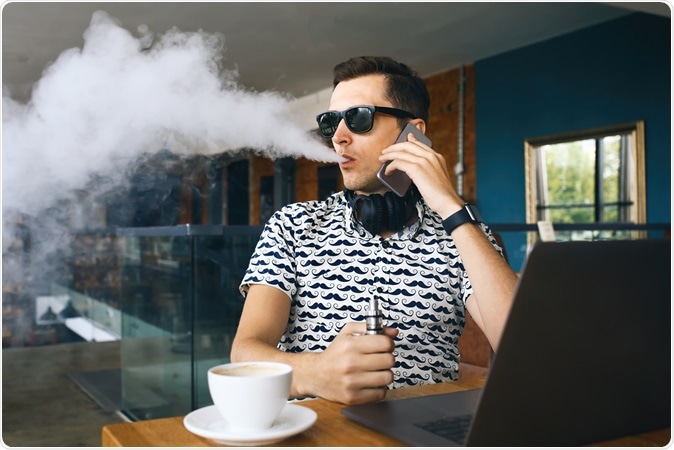Governor of New York Andrew M. Cuomo has signed a legislation that prohibits electronic cigarette smoking in areas and regions where smoking tobacco products are banned. This is an addition to the Clean Indoor Air Act. This bill - S.2543A/ A.516A, is meant to prevent the exposure to the harmful chemicals from the e-cigarettes to people around these smokers.
At present smoking tobacco products such as cigarettes, cigars or pipes were banned in public places to protect non-smokers from the harmful effects of passive smoking.

Image Credit: Alex Borovsky / Shutterstock
Governor Cuomo said in a statement, “These products are marketed as a healthier alternative to cigarettes but the reality is they also carry long-term risks to the health of users and those around them… This measure closes another dangerous loophole in the law, creating a stronger, healthier New York for all.” Several countries and other states such as California, Connecticut, New Jersey and Utah have already prohibited the use of e-cigarettes in public places such as work places, public transport, restaurants, cinemas etc. Some have banned their use in offices, Government areas and schools only. This year in July, Governor Cuomo had signed a legislation banning e-cigarette smoking in the public and private school grounds in New York State. This new legislation adds upon the earlier law.
According to Senator Kemp Hannon, “As the proud sponsor of this legislation, I am pleased New York will be taking this step to protect New Yorkers from the potential harms of e-cigarettes. E-cigarettes often contain toxic chemicals in addition to nicotine, something bystanders should not be forced to breathe. With recent reports showing their use among minors increasing, New York must continue to work to regulate these devices in a common sense manner.” Assembly member Linda B. Rosenthal too added that this was “closing the e-cigarette loop hole” in the Clean Indoor Air Act and was a “long-overdue step that will help protect every New Yorker's right to enjoy indoor public spaces free from the intrusion of e-cigarette vapor.” The law comes into effect from next month. The ban does not cover private homes, hotel rooms and tobacco outlets.
Electronic nicotine and vapor delivery systems or e-cigarettes are devices such as e-hookahs or vaping pens etc. that are made to deliver nicotine, albeit in lower doses. They are a growing industry worth $2.5-billion according to the Centers for Disease Control and Prevention. They are cited as a healthier alternative to smoking traditional cigarettes and the long term consequences of these devices on health is still not clear.
Last year in May, the Food and Drug Administration banned the sale of e-cigarettes to minors. This was part of new set of regulations that came into being. Studies have shown that up to 20 percent of children had tried these vaping devices believing that they were less harmful than regular tobacco products. These numbers have doubled from the previous two years say experts.
Manufacturers of these devices have protected these bans mounting legal actions. They argue that these vaping devices do not emit smoke and thus do not pose a danger to the people around a user. The latest challenge to New York City’s ban was rejected in the New York State Court of Appeals.